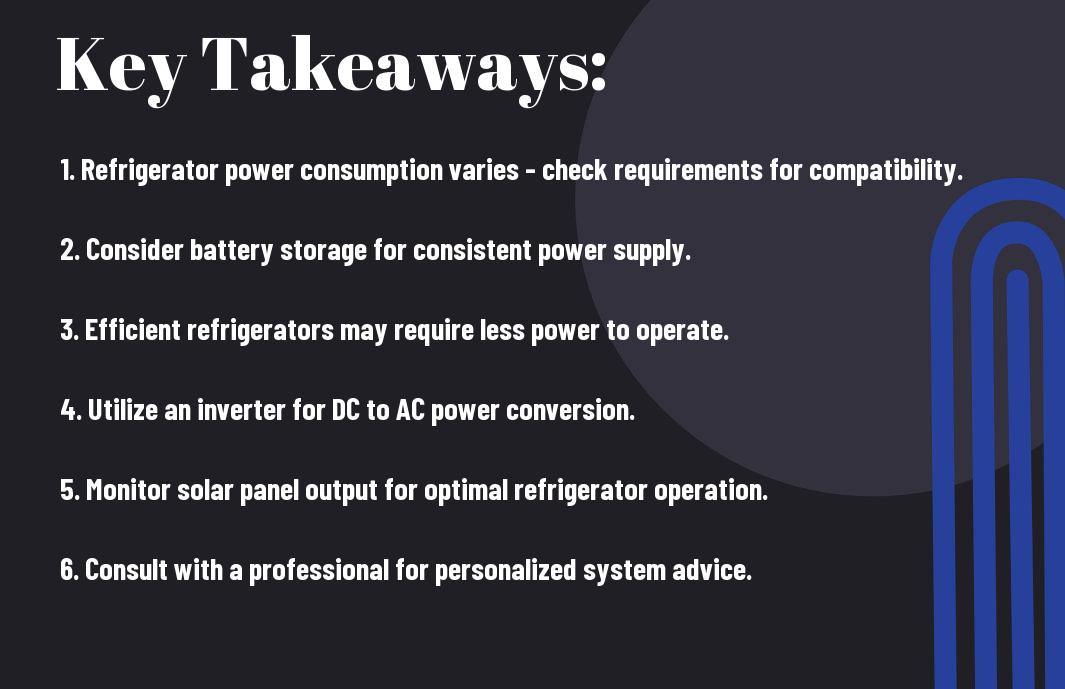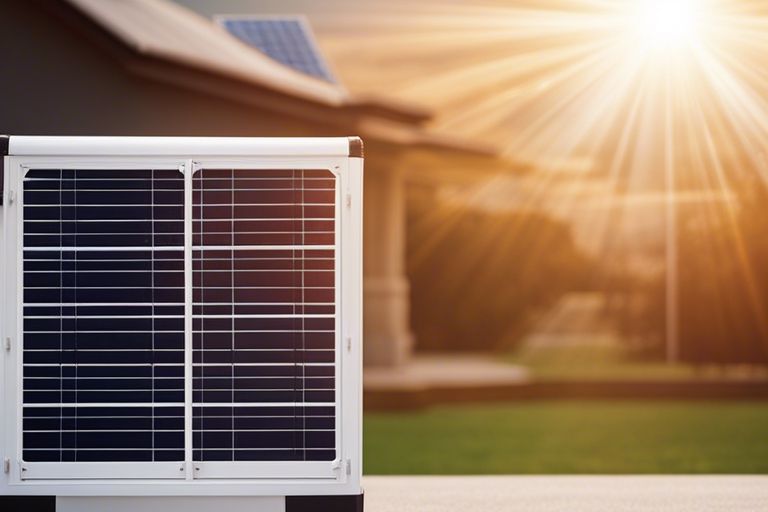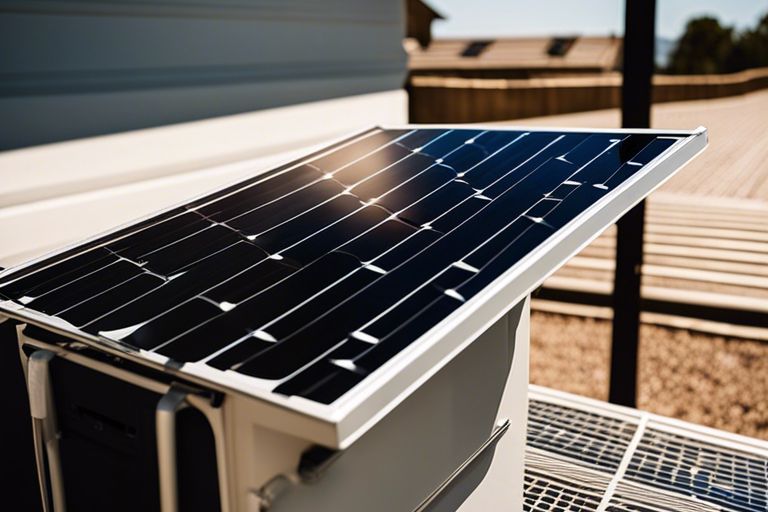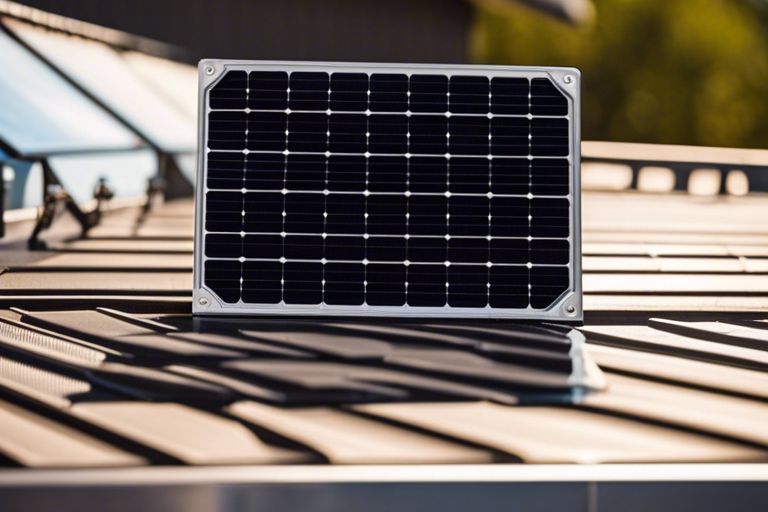With the increasing interest in solar power, you might be wondering if a humble 100-watt solar panel can handle a hefty appliance like a refrigerator. Well, let’s break it down for you. In this informative post, we’ll explore the power requirements of refrigerators, the efficiency of solar panels, and what it all means for your quest to go off the grid. So grab a cold beverage (courtesy of your trusty fridge) and let’s dive in!
Key Takeaways:
- Sizing of solar panel: A 100 watt solar panel may not be enough to run a refrigerator continuously due to the high energy consumption of most refrigerators.
- Additional components: In order to run a refrigerator off a 100 watt solar panel, you may need additional components such as batteries, charge controllers, and inverters.
- Energy efficiency of the refrigerator: A more energy-efficient refrigerator will require less power to run, making it more feasible to operate with a 100 watt solar panel.
- Intermittent usage: Running a refrigerator intermittently, rather than continuously, can help reduce the energy requirement and make it possible to run on a 100 watt solar panel.
- Consider alternative power sources: If a 100 watt solar panel is not sufficient to power a refrigerator, you may want to explore alternative power sources or consider upgrading to a larger solar panel system.

The Basics of Solar Panels
How Solar Panels Work
Your journey into understanding if a 100 watt solar panel can run a refrigerator begins with the basics of how solar panels work. Any solar panel is made up of photovoltaic cells that convert sunlight into electricity through the photovoltaic effect. When sunlight hits the solar panel, it excites the electrons in the cells, creating an electric current. This direct current (DC) is then converted into alternating current (AC) through an inverter, making it usable for powering your appliances.
Factors Affecting Solar Panel Efficiency
Panel orientation: The direction your solar panel is facing affects its efficiency. For optimal performance, your solar panel should ideally face south in the Northern Hemisphere and north in the Southern Hemisphere to capture the most sunlight throughout the day. Other factors like shading, temperature, and the angle of the panel also play a role in determining how efficiently your solar panel operates.
- Panel tilt angle
- Shading from trees or buildings
- Temperature
For instance, if your solar panel is partially shaded during peak sunlight hours, its efficiency can significantly decrease. After considering these factors and optimizing your panel’s placement, you can ensure that it operates at its highest efficiency to power your appliances effectively.
Refrigerator Power Requirements
Now let’s probe the power requirements of refrigerators to understand if a 100 watt solar panel can run one efficiently.
Types of Refrigerators and Their Power Needs
Regarding refrigerators, there are different types with varying power needs. The size, age, and efficiency of the refrigerator all play a role in how much power it consumes. Here are some common types of refrigerators and their average power requirements:
- Compact Refrigerator: 100-150 watts
- Top-Freezer Refrigerator: 100-200 watts
- Side-by-Side Refrigerator: 150-300 watts
- French Door Refrigerator: 200-400 watts
- Commercial Refrigerator: 300-800 watts
Any additional features like ice makers, water dispensers, or smart technology will also increase the power consumption of the refrigerator.
Calculating Refrigerator Energy Consumption
For calculating the energy consumption of your refrigerator, you need to consider the wattage of the refrigerator and how many hours per day it runs. This will give you the daily energy consumption in watt-hours (Wh). Typically, a refrigerator runs about 8-12 hours a day, depending on usage and efficiency.
Any fluctuations in temperature or frequent opening of the refrigerator door can also impact its energy consumption. It’s vital to factor in these variables when determining the overall power needs of your refrigerator.
This method allows you to estimate how much power your refrigerator consumes on a daily basis, which is crucial in determining if a 100 watt solar panel can adequately supply the required power.
Can a 100 Watt Solar Panel Run a Refrigerator?
Despite the allure of going off-grid and living sustainably, the idea of powering a refrigerator with a single 100-watt solar panel may seem far-fetched. Let’s examine into the details to see if this is a feasible option for you.
Theoretical Calculations
One way to estimate whether a 100-watt solar panel can run a refrigerator is by conducting theoretical calculations. You can start by determining the energy consumption of your refrigerator in a 24-hour period. Next, consider the average sunlight hours in your location to calculate how much energy your solar panel can generate daily. However, remember that this approach simplifies the complexities of real-world scenarios.
Real-World Considerations
Theoretical calculations aside, several real-world factors can impact the efficiency of running a refrigerator on a 100-watt solar panel. These include variations in sunlight exposure, energy losses in the conversion process, and the intermittent nature of solar power. It’s important to consider these variables to ensure a stable power supply for your refrigerator.
Refrigerators, by nature, are energy-intensive appliances and may require more power than a single 100-watt solar panel can consistently provide. To overcome this limitation, you may need to implement energy-saving measures, such as using a more energy-efficient refrigerator or supplementing your solar panel setup with additional power sources.

Limitations of a 100 Watt Solar Panel
Power Output Fluctuations
For Will a 100 watt solar panel run a refrigerator, it’s vital to consider the power output fluctuations of a 100-watt solar panel. Solar panels rely on sunlight to generate electricity, which means that the power output can vary throughout the day based on factors like weather conditions, cloud cover, and the angle of the sun. This variability can affect the efficiency of running higher power devices like refrigerators consistently.
Battery Capacity and Charging Time
Power limitations also stem from the battery capacity and charging time when using a 100-watt solar panel. Solar panels charge batteries, which store the electricity for later use. The battery capacity determines how much power can be stored, so if your refrigerator consumes more power than the battery can store, it may not run continuously. Additionally, the charging time of the battery can impact the refrigerator’s functionality as it needs a consistent power supply to function properly.
This means that even if a 100-watt solar panel can technically power a refrigerator, the battery capacity and charging time must be sufficient to support the refrigerator’s power needs. If these factors are not adequately matched, you may experience interruptions in running your refrigerator solely on a 100-watt solar panel system.
Alternative Solutions
Using Multiple Solar Panels
The 100-watt solar panel may not be enough to run a refrigerator on its own, but fear not! You can consider using multiple solar panels to generate more power. By connecting several panels in parallel or series, you can increase the total wattage produced. This setup can provide enough energy to run your refrigerator efficiently while also powering other devices in your home. Just make sure to calculate the total power consumption of your appliances to determine how many panels you need.
Supplementing with Other Power Sources
Alternative to solely relying on solar panels, you can supplement your power source with other methods like wind turbines or a backup generator. Wind turbines can harness wind energy to generate electricity, offering a reliable power source even when sunlight is limited. Additionally, a backup generator can kick in during prolonged periods of low sunlight or when there is not enough wind to turn the turbines. This way, you can ensure a constant power supply to run your refrigerator and other necessarys in your home.
Plus, incorporating a battery storage system can help store excess energy generated by your solar panels or wind turbines. This stored energy can be used during the night or on cloudy days when renewable energy generation is low. Having a combination of renewable energy sources and a backup generator with battery storage ensures a reliable and continuous power supply, keeping your refrigerator running smoothly at all times.

System Design and Installation
Not everyone is a solar power expert, which is why it’s vital to understand the fundamentals before designing and installing a solar system to run appliances like a refrigerator. If you’re wondering if a 100-watt solar panel can run a refrigerator, you’ll find detailed information on system design and installation in the blog post “Can a 100 Watt Solar Panel Run a Refrigerator?.”
Choosing the Right Components
Any off-grid solar system requires careful consideration when selecting components to ensure optimal performance. When looking to power a refrigerator with a 100-watt solar panel, you need to think about the battery capacity, inverter size, and charge controller compatibility. These components must work together efficiently to store and convert the solar energy for running your appliance effectively.
Installation Considerations for Off-Grid Systems
On your journey to setting up an off-grid solar system for your refrigerator, proper installation is key to maximizing the efficiency and lifespan of your equipment. Pay attention to factors like panel orientation, shading, and wiring to ensure your system operates at its best. Additionally, consider the location of your solar panels to receive optimal sunlight throughout the day for maximum energy production.
System placement is crucial for off-grid solar setups. Ensure your panels are facing the right direction to capture the most sunlight and avoid any obstructions that may cast shadows and reduce efficiency. Proper wiring and grounding are also vital to maintain system safety and performance. Taking the time to plan and install your off-grid solar system correctly will help you enjoy reliable power for your refrigerator while reducing your carbon footprint.
Conclusion
With this in mind, it’s important to consider the power requirements of your refrigerator before attempting to run it off a 100 watt solar panel. While a 100 watt panel may be able to power a small refrigerator with careful energy management, larger fridges with higher energy consumption will likely require a larger solar panel system. Remember to also factor in battery storage capacity and inverter efficiency for a successful setup.
To conclude, while a 100 watt solar panel may not be sufficient to run a standard refrigerator on its own, with proper planning and energy-saving practices, you may be able to power a small fridge in a remote location or during a power outage. It’s always a good idea to consult with a professional to ensure that your solar panel system meets the energy needs of your refrigerator while also being environmentally sustainable and cost-effective in the long run.
Q: Can a 100 watt solar panel run a refrigerator?
A: It is highly unlikely that a 100 watt solar panel can run a typical household refrigerator. Refrigerators require a substantial amount of power to operate continuously, and a 100 watt solar panel may not be sufficient to meet that demand.
Q: What size solar panel do I need to run a refrigerator?
A: To run a refrigerator using solar power, you would generally need a solar panel system with an output of at least 600 watts. This would provide enough power to run a standard-sized refrigerator efficiently.
Q: Can I use a 100 watt solar panel to supplement power for a refrigerator?
A: While a 100 watt solar panel may not be able to solely power a refrigerator, it can be used as a supplemental power source to reduce energy consumption from the grid. By combining a 100 watt solar panel with other renewable energy sources, you can decrease your reliance on traditional power sources.
